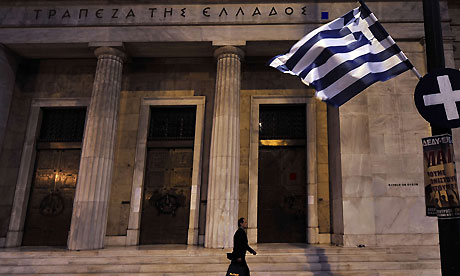BY
Last week, the Greek standoff with the rest of Europe provided theater worthy of Aeschylus. Greece is running out of money. The rest of the eurozone is running out of patience. Depositors in Greek banks are running for the exits. It is this last group that matters most in the near term.
According to JP Morgan, outflows from Greek banks were around 3 billion euros last week, up from 2 billion the week before. Without some sort of backstop, when bank deposits flee, banks are forced to stop lending. A widespread lending stop would bring the economy to a halt.
Greece is not quite at that point yet. It has an estimated 108 billion euros available from central bank sources, of which it has used roughly 85 billion. That is the relevant clock that is ticking, though it is hardly the only one. The Greek government also has debt payments coming due and it needs money for domestic spending at a time when tax receipts are drying up.
You know you’re in bad shape as a country when the argument is over which of your “Countdown to Doom” clocks is most pressing. In Greece’s present case, the prize goes to the “bank run” clock, primarily because it has variable speeds. If bank depositors decide that the game is up, it becomes exceedingly difficult to persuade them to proceed toward the exits in a polite and organized fashion. The fund outflow pace of two weeks ago seemed to grant Greece 14 weeks grace, according to JP Morgan. Last week’s pace granted them only eight weeks. What will this week bring?
When everyone adjourned on Friday last week, Greece promised to return early this week with more promises. Germany and the other eurozone countries were sufficiently gracious in their promise to review forthcoming Greek promises that this was all hailed as a resolution. It certainly sounded a lot better than the bald-faced rejections that had characterized the dialogue earlier last week.
But what was resolved? On Feb. 20, the think tank Open Europe declared, “Greece bends to Eurozone will to find short-term agreement.” Given the brash stance that the new Syriza government in Greece had taken after its recent election, its concessions looked significant and humbling. If Greece’s promised reforms are deemed sufficient, the eurozone countries agreed to continue providing Greece with desperately needed funds for four months. Aside from a new submissive posture by the young Greek government, though, what has changed?
Greece’s economy is growing slowly, if at all. This makes it unlikely that Greece’s unsustainable debt levels (measured against GDP) will improve any time soon. Greek GDP is down more than 25 percent from 2009.
According to Eurostat, Greek unemployment was 25.8 percent in October 2014. Youth unemployment was 50.6 percent.
Greek taxpayers, not sure where this is all headed, have recently decided that it might be a prudent moment to step up tax evasion, so tax revenue has fallen.
Even if the eurozone countries accept Greece’s list of proposed reforms, it is hard to see how any of this will change much. Greece still looks like it cannot continue on the present path. The ever-perceptive Wolfgang Münchau writes in the Financial Times that the present squabble is an opening skirmish — the battle is yet to come. The real battle involves “determining the long-term trajectory of the Greek fiscal position.” Greece is supposed to take debt from 175 percent of GDP to 110 percent by 2022. “Economic history tells us adjustments of such scale do not work because electorates do not stand for it.”
And this was the source of the Syriza squeeze last week. The Greek party had been elected to reject eurozone demands. Yet last week made clear that such rejection would bring a plunge into crisis. But acceptance of the eurozone demands could leave an electorate feeling betrayed while it perpetuates a status quo that meets most standard definitions of a crisis — and without any end in sight.
Which brings us back to the relevant audience for this drama: the Greek bank runners. If you have an account in Athens, are you persuaded that this will end well? Or do your oracles foretell of capital controls and a new, depreciated Drachma? If the latter, you may just hold the applause and stash the cash.









